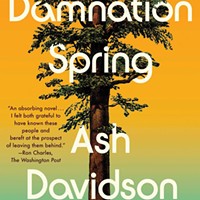'This is the Land We Dream of, the Land that Belongs to Us Again'
Brando Skyhorse's The Madonnas of Echo Park
By Cassie Curatolo [email protected][
{
"name": "Top Stories Video Pair",
"insertPoint": "7",
"component": "17087298",
"parentWrapperClass": "fdn-ads-inline-content-block",
"requiredCountToDisplay": "1"
}
]
This week author Brando Skyhorse visits several locations in Humboldt County for a pair of readings and discussions. Skyhorse's first work, Take this Man: A Memoir, in which he recounts the quirks and the tragedies of his childhood in Los Angeles, generated much praise. His first novel, The Madonnas of Echo Park, is the 2018 College of the Redwoods and Humboldt State University Book of the Year. It received the 2011 PEN/Hemingway Award and the Sue Kaufman Prize for First Fiction from the American Academy of Arts and Letters.
The Madonnas of Echo Park paints a picture of Los Angeles that is both loving and critical, honest and embellished, heartbreaking and hopeful. The novel offers snapshots of the Mexican and Mexican-American working class in Echo Park, a stretch of the Los Angeles basin that was once a backlot for silent movies before film production migrated to Hollywood. Now experiencing gentrification and the exodus of the ethnic groups that called it home for so long, Echo Park has lived many lives — not unlike Skyhorse's characters over the course of the novel.
Skyhorse employs several narrators with wholly different voices, backgrounds, social and economic statuses, motivations, desires and morals to construct a patchwork story. Felicia, for instance, is a cleaning lady and mother whose daughter is nearly caught in the crossfire of a drive-by shooting. The child who does die, rechristened "Baby Madonna," is immortalized on a mural in Echo Park. Felicia describes her line of work as both "intimate and invisible," but at one point strikes up a short, tragic friendship with one of the wealthy white women who employ her. Manny Mendoza Jr. is an aging ex-gang member and ex-con who has become introspective. He laments the breakup of his son and his Vietnamese girlfriend Tran (who his son dates against his Chicana mother's wishes), and the multiracial grandchildren they might have borne him. He worries about his son, who will soon be deployed overseas with the U.S. Army. Hector is an undocumented day laborer with no memory of Mexico. He is paid off by his foreman when he witnesses the murder of another employee on the jobsite and risks being deported if he turns him in to authorities. In a poignant and powerful twist on a "six degrees of separation" plot, the lives of Skyhorse's characters collide over several generations, revealing the ways in which they are bound together, not only through the struggle to survive and assimilate to (white) American society but more specifically the ways in which they are bound through place. Echo Park becomes fabric on which their common thread is embroidered, the backdrop that both necessitates and propels their actions.
"Laid out in front of the dawn like a rug made of jigsaw pieces was Los Angeles. Through the wire-mesh window screens, endless fly strips of houses, homes, and the skeletons of those yet to be built; naked mounds of land that would soon be smothered by new homes, built with hands, and on the bonds, of the old landlords, homes in such a starry multitude that I was confident there was one for me, and in that home there'd be enough space for my small life, and the hopes I'd bring back with me."
— Brando Skyhorse
Of course, like the stories of so many ethnic "others," The Madonnas of Echo Park is also a study of the ways in which identity is always in flux and belonging is always at stake. Skyhorse masterfully illustrates the illusive, yet permeable lines between insider and outsider, as his characters, at times, shed their ethnic heritage in order to fully embrace American culture, which is for many the culture they were born to inherit. Other times, they manage to blend multiple identities in a way that feels most authentic. They navigate the various neighborhoods of Los Angeles in the same way they navigate the ever-moving boundaries of cultural and ethnic belonging: sometimes selfishly, out of necessity, in pursuit of reinvention, but always with both caution and bravery.
Brando Skyhorse will read and discuss his work on Thursday, Nov. 8, at 3:30 p.m. in the Native American Forum (BSS 162) at Humboldt State University. Meet the author for book signing at 2:30 p.m. in the BSS lobby. Skyhorse will also speak on Friday, Nov. 9, at 7:00 p.m. in the Performing Arts Theater at College of the Redwoods. Doors open at 6:30 p.m. Both events are free and open to the public, and copies of the book will be available for purchase on site.
Speaking of...
-

World Premiere of 'A'-t'i Xwee-ghayt-nish: Still, We Live On
Nov 10, 2023 -

Character Study
Mar 23, 2023 -

NCJ Preview: Flash Fiction and Local Delivery
Dec 26, 2020 - More »
more from the author
-
Happy Families
The Fantastic Mr. Fox and Mamma Mia!
- May 9, 2019
-
Wheels Up
United Skates rolls out the history
- Feb 28, 2019
-
Black History and Liberation Month
- Feb 15, 2019
- More »

































